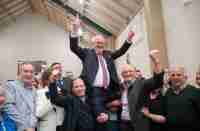Poll-topping ‘Ming’ on the issues that continue to drive his work…
Prior to his re-election to the European Parliament being confirmed a few days later, MEP Luke ‘Ming’ Flanagan was an interested observer at the Roscommon local election count in the Hyde Centre.
Speaking to the Roscommon People, the Castlerea native discussed how although local and European politics are different worlds, the issues being dealt with on the European level often link in with major concerns at home.
“Obviously in terms of local politics you have your bread and butter issues like how much money is going towards certain things”, he explained, “and of course a major concern is around Lough Funshinagh, whether it’s going to completely flood the community if something isn’t done urgently.
“But as well, if you take an issue like Gaza; that is an international question that also plays into the immigration issue.
“Whether it’s Gaza, Syria, Iraq, Afghanistan, Ukraine… we know the national implications. If it’s not dealt with properly, people are forced to flee their homes. And we saw how immigration became a huge issue in both elections”.
Similarly, he referenced how issues like international trade may not initially seem particularly relevant to local people, until “trade agreements allow super-trawlers to come in and destroy local fishing industries” – with the now three-term MEP further discussing the huge importance of tackling agricultural concerns.
“In my younger days, as a ‘townie’, I wouldn’t have had a massive interest in farming”, he admitted. “But I’ve worked out over time how much it can be the be-all and end-all in politics in these areas; towns like Castlerea, Ballaghaderreen, Ballyhaunis – they’d only be a quarter of the size if it wasn’t for the agricultural community.
“How we produce our food is the most important thing”, he continued. “We’ve had a famine in this country; we know what it’s like to go without food”.
Another issue touched upon by ‘Ming’ during his chat with the Roscommon People was mental health services in Ireland, particularly within the context of neurodivergence, with the politician drawing on his own experience of having been recently diagnosed with autism.
“We have a situation in Ireland where you cannot get an autism diagnosis through the public health system, you have to go private and pay for it”, he explained. “And I was conscious of this when I disclosed my diagnosis, because while it was very significant for me and, I felt, very important to do, I know it’s a total luxury for most adults in Ireland”.
He also highlighted the disproportionate way in which women are less likely to be diagnosed, because of how they are socialised to mask/conform to societal ideals: “Growing up, women are told to cop on and get on with it, because (neurodivergent stims, etc) are seen as ‘unladylike’”.
He described the lack of publicly funded and adequately provided services in Ireland as “horrific”, saying, “Imagine if you had a situation where you broke your leg and had to go to a charity to get it fixed – or worse still, that when you did, there weren’t enough people there to help, or the waiting list was months’ long.
“That’s what’s happening with neurodivergence. That’s what’s happening with mental health services. And that has to change”, he said. “Ireland is one of the richest countries in the world and we’re leaving people behind”.
The MEP continued: “I’ve to thank my youngest daughter, who’s nineteen and was also diagnosed autistic, which led to my diagnosis”, he continued. “She’s helped me realise more about this than any expert could’ve”.
‘Ming’ described the experience as having been an invaluable one in many ways because, “I thought I was very open-minded. But you always have blind spots, and the experience called me out on that and made me more aware”, he said, telling the People that prior to engaging properly with the topic, he’d had unfounded “biases”, “judgements” and “misunderstandings” around neurodivergence that he’s since been able to rectify.
He explained that it was an important lesson in being open to evolve and to listen and to learn, and also in the immense value a diagnosis can have in giving people answers and helping direct them to the resources they need – something he noticed both for himself and his family.
“It just shows you”, he said, “listen to your children. There’s a saying: ‘You’ll only be as happy as your unhappiest child’. Well, I’m quite happy now because my unhappiest child isn’t that unhappy any more”.
MEP Flanagan topped the poll in Midlands-North-West and was deemed elected on Thursday night last.
“I knew what was coming, what to expect. I’ve developed a standard strategy where I try to call to every town I can, and every business along the way, and that is always invaluable.
“Except of course this time, I wasn’t telling people about what I’d potentially do – this time, I was telling them what I had done, and what financial benefits it had for the constituency.
“As my campaign slogan said – I understand the job!”






